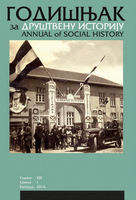Примена западног законодавства на Балкану: упоредна анализа увођења радничког законодавства у Краљевини СХС и Бугарској
The application of Western legislation in the Balkans: A comparative analysis of the introduction of labor legislation in the Kingdom of SCS and Bulgaria
Author(s): Jelena RafailovićSubject(s): Social history, Interwar Period (1920 - 1939)
Published by: Udruženje za društvenu istoriju
Summary/Abstract: The paper describes the introduction and implementation of labor legislation in the Kingdom of Serbs, Croats and Bulgaria after the First World War. Labor legislation, covering the working time of eight hours, the Act on Hygiene and the Protection of Workers and the Law on Social Security, that was established under the pressure of international institutions in most cases was not respected, but represented a major step towards the development of economic and social institutions in these two countries. Protest and resistance of businessmen due to the introduction of social and labor laws reflected on underdeveloped and weak industries, just as the Bulgarian and Yugoslavian were. It could be concluded that the social legislation existed, but was not applied. The Western forms of legislation applied to the Balkan states had the fate of the majority of other institutional modern innovations – remaining only on paper, and being the subject of circumvention as often as possible.
Journal: Godišnjak za društvenu istoriju
- Issue Year: XXI/2014
- Issue No: 1
- Page Range: 75-97
- Page Count: 23
- Language: Serbian

